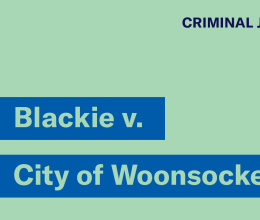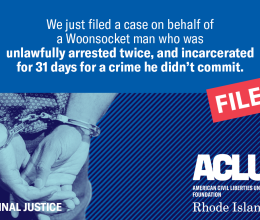The American Civil Liberties Union of Rhode Island and the R.I. Disability Law Center (RIDLC) have asked the U.S. Attorney’s Office for Rhode Island to address local law enforcement agencies’ lack of compliance with federal laws requiring them to provide effective communication with people who are deaf and hard of hearing.
In 2016, the two groups successfully sued the Woonsocket Police Department on behalf of a profoundly deaf person, David Alves, who was arrested and detained overnight in jail on a minor offense. Mr. Alves was not provided technology to allow him to place a phone call, nor was he provided an interpreter to enable him to communicate with the police during his detention. The lawsuit argued that the Department’s failure to procure an interpreter or provide other means to effectively communicate with Mr. Alves violated federal and state laws barring discrimination on the basis of disability. The case settled after the Department agreed to take numerous steps to ensure they met their legal obligations in working with people who are deaf or hard of hearing.
In March of 2017, following that settlement, the ACLU and RIDLC urged all the other local police departments to review their policies, practices and technologies for compliance with the law. Among other issues raised, the letter noted that reliance on a communication technology called TTY was no longer prudent because TTY is outdated and not accessible to people who rely on sign language.
Last August, the ACLU and RIDLC followed up that letter with a formal Access to Public Records Act (APRA) request for each police department’s “policies, procedures or any other documents of general guidance . . . that address police communication with persons who are deaf or hard of hearing.” The troubling results of that request led to the groups’ filing of the investigation request with the U.S. Attorney’s Office.
An analysis of the APRA responses by RIDLC found, among other things, that:
- Each of the law enforcement entities either identified TTY as the communication device in place that would enable a detainee to make a phone call or left it unclear as to the technology they use.
- 20 law enforcement entities indicated they offer the RI Relay Service as an option that would allow a detainee to place a phone call, but they did not produce documentation that they have the necessary technological capacity to actually provide this service.
- 24 law enforcement entities produced policies that were either not relevant to effective communication with people who are deaf and hard of hearing or did not reflect important updated Department of Justice requirements that went into effect in 2011.
- 10 law enforcement entities produced responses that were unclear as to whether the entity staff knows how to contact a sign language interpreter when needed.
The letter to U.S. Assistant Attorney Amy Romero concluded:
“Our findings reveal that many law enforcement entities in Rhode Island have inadequate or non-existent policies and practices concerning effective communication with people who are deaf or hard of hearing, while other entities have policies but lack technical information and/or technology to properly implement said policy. We call upon the District of Rhode Island U.S. Attorney’s Office to address this important issue with the RI law enforcement entities.”
ACLU of RI executive director Steven Brown said today: “The lawsuit we filed against the Woonsocket Police Department has revealed how unprepared most police departments are to meet their legal obligations and address the needs of the deaf and hard of hearing. We are hopeful that intervention by the U.S. Attorney’s Office will lead to positive changes.”
A copy of the letter to the U.S. Attorney can be found here.
Last year’s letter to police departments can be found here.
For more information on the aforementioned successful lawsuit, Alves v. Woonsocket, click here.








